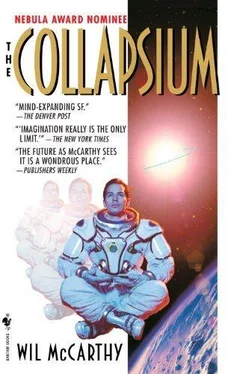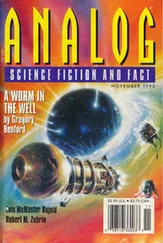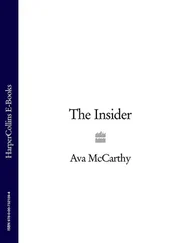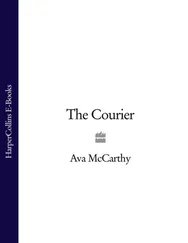“Marlon,” he said, “how long between chromopause penetration and total solar collapse?”
“Four months,” Sykes puffed without hesitation.
“Hmm.” Bruno placed his chin in his hand, thoughtfully, wishing again for a less distracting environment. He didn’t want to lead his fellow humans or absorb their admiration; he just wanted another look at the Ring Collapsiter, and some quiet time to think. “We’re only a quarter of the way up, you know,” he said to Tamra, “I’ll make it,” she replied. “But I think a lot of us need to catch our breath.”
Looking down at the crowd behind her, he nearly said, “I didn’t ask them to come.” But he didn’t like the way that might sound on later repetition, so instead he raised his voice and called out, “We’ll rest for a few minutes, and then proceed more slowly.”
He watched the faces react to that, all the faces and bodies spilling out below him like the followers of some wise, all-knowing Moses. A mad prophet, yes, late of the wilderness; he should have let the ladies trim and color his hair after all. Grumpily, he sat.
A snowflake lit beside him on the stone, failed to melt, and was whisked away again by the sighing wind. Strange, the rock didn’t feel that cold beneath his hands; the snow should have melted. In a sheltered corner, he spied a little pile of it, gathered there like dust. He stretched a hand out to touch it, found it dry and somewhat sharp. Not quite like coarse sand or tiny glass shards, but similar in some way to each.
“This isn’t snow,” he said, surprised, pinching a bit between his fingers and dropping it into his palm for examination.
“Snow?” Ernest Krogh asked, eight steps below him.
“It’s wellstone flake,” Rodenbeck called up from two steps farther down. “Also known as terraform ash. It sprouts reactive ions to strip ‘unwanted’ chemicals from the air, then settles out, changes composition, and sloughs the impurities off as solids to join the lithosphere. Then the wind carries it up again, and it starts all over. There are equivalent devices freeing oxygen and nitrogen from the rocks; it’s precisely the antagonist of nature: the geochemical cycle running in reverse.”
“Only much quicker,” Krogh added with a trace of smugness.
Bruno peered at the little crystals, so much like snow-flakes. The design made immediate sense: maximum surface area for a given mass, to increase reaction space, to maximize the chemistry a single flake could perform. How many were needed to change a whole planet? What fraction were really lifted into the sky again, after settling to earth? He imagined dunes of the stuff piling up here and there, strange geological strata for future generations to ponder. An immortal society could afford to be patient, but still it was no wonder this enterprise was short of cash. A small enterprise, yes, compared with shipping neutronium all the way up to the Kuiper Belt. But that didn’t make it easy, or cheap.
“We could just love Venus on her own merits,” Rodenbeck said, in weary, futile rebuttal. “Attacking her isn’t compulsory. You’re the worst sort of real-estate developer, you know; a sanctimonious one.”
Krogh laughed. “Son, when you buy a planet, I promise to let you care for it as you choose. No one will dream of stopping you. But the shareholders of Venus have voted, almost unanimously, to alter it. Most of us live here after all, or plan to, and while we don’t desire a second Earth, we do at least hope for homesteads that won’t rust and implode the moment we erect them. You know very little of our hardships here.”
“Yeah, yeah, poor baby. You knew the conditions when you moved here.”
“Hush, you two,” Rhea Krogh said, with a sort of long-suffering amusement.
Other conversations drifted upward, along with some coughs and wheezes.
“If you’re having trouble breathing,” Rhea called down, “do please go back inside. Her Majesty can’t take responsibility for the way I’d feel if anything happened.”
No one took her up on the offer.
“At the very least, go fax yourself an oxygen tank and some filters.”
A few responded to that, turning around the way they had come, their steps a little lighter in descent. Bruno let a few more minutes go by, giving them every chance, before rising to his feet once more and resuming the climb at a much-reduced pace and with many backward glances.
Leadership, iconhood, bah. Was it so wrong, simply wanting to do his work? Was that so grave a trespass on the rights of humanity? Humanity certainly seemed to think so. Could everyone be wrong but himself? Was that a reasonable thought to entertain? They trusted his opinion with regard to collapsium, why not with regard to himself? Perhaps, after all, they knew something he didn’t. Or perhaps, as with the collapsiter grid, their need simply outweighed any cautions or caveats, outweighed Bruno’s own desires. The good of the many demands the sacrifice of the able, yes?
The worst of it was that he had no role models, no historical personages from whom to draw example. Wealthy, strong, well connected to the seats of power; there’d been many like that, some of them even philosophers and inventors, the Declarant-equivalents in their respective eras. But none of them immortal, none forced to live eternally with the consequences of their actions. How paralyzing would they have found it, the eyes of history always on them, not for the sake of posterity but for on-going and literally ceaseless dissection? Knowing that their adolescent bumblings would look ridiculous even to their future selves, and worse, that such adolescence would never end?
Perhaps some could have managed it. Perhaps some would manage it in the far future, with Bruno’s failed example to look back on. But that didn’t help him now, didn’t show him how to be this flawless philosopher-saint of society’s expectation.
Bah. Bah! Better to worry about the collapsium, about the physics underlying it, and the universe underlying that, and the arc defin that might somehow make sense of it all. That should be his historical role! That!
But his opinion mattered little; tonight he was a mountain guide, leading idle stargazers to their latest amusement. Well, not amusement; not that. Their lives did hinge on the fate of the Ring Collapsiter, after all. And they didn’t know how to fix it, and they thought perhaps he did; they were therefore understandably eager for his answer. So perhaps there was nothing strange about any of this, no reason for his ire or discomfort. Had he been harsh, foolish? Probably, yes.
So his thoughts had come full circle, and every time someone coughed or stumbled or demanded a rest on that long, slow climb, the circle began anew, starting and ending in the same places like a stuck recording, belying the myth that Bruno’s mind was extraordinary, somehow elevated above the norm. Bruno’s mind was, in point of fact, messier than his living room, crowded with lusts and irrationalities and stuck recordings beyond number. It was a wonder he accomplished anything at all.
But he engaged Marlon Sykes in sporadic conversation, when certain non-useless thoughts occurred to him. He looked up and down, as the mountain slowly grew beneath them and shrank above. He tugged his beard, pinched his chin, even fretted periodically about the Ring Collapsiter’s fall, and how it might be averted. F=ma, obviously, and by corollary, F=ea/c 2. Did that help? If so, it wasn’t apparent.
Finally, the summit approached, the sky widening above and below them. It was unsettling, the way the sky never changed. The hazes drifted slowly in the jet stream, yes, but the post-sunset colors that lit them refused to deepen, to lose the last hints of red, to fade to blue and then darkness. The stars refused to really come out. There was no moon, and beneath the gloomy cloud deck below them, it was easy to imagine nothingness: Venus a planet of pure sky with no solid surface at all except this mountain, rising up like a pillar from the depths.
Читать дальше












